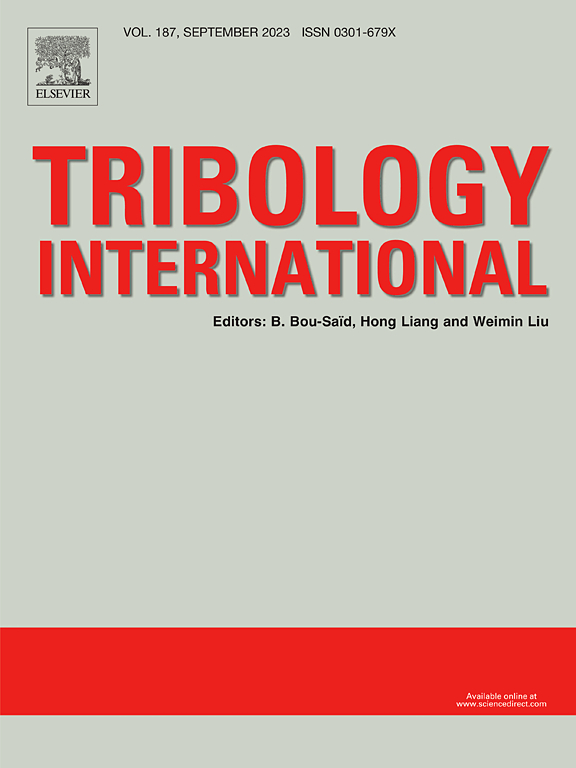Influence of large deformation on plastic yield inception and associated mechanism during spherical indentation of soft materials
IF 6.1
1区 工程技术
Q1 ENGINEERING, MECHANICAL
引用次数: 0
Abstract
Soft materials typically experience large deformations before the onset of plastic yielding during indentation. The inception of plastic yield and associated mechanisms are significantly different from those of hard materials under small deformation, where the influences of large deformation are investigated in this paper. A parametric finite element model is developed to solve the indentation of elastic-plastic soft half-spaces by rigid spherical indenters, encompassing a wide range of soft materials. The stress and deformation fields at the onset of plastic yielding, along with the critical contact parameters for initial yield, are accurately determined. A soft material range, referred to as the FYD range, in which finite deformations are required for initial yield, is identified. Within the FYD range, the characteristics of the stress field exhibit alteration, the individual stress components reduce unevenly, the Mises stress substantially changes, and the load and indentation needed for plastic yielding inception significantly reduce. The interaction between large deformation and frictional traction results in significantly different yield behaviors compared to those observed in hard materials at small deformation. Three novel yield deformation mechanisms are found to be universal and driven by large deformations. These include the significant compression of the stress concentration region, significant flattening of the stress concentration region, and the occurrence of a partial tension zone on the contact surface. Large deformations strongly influence the mechanisms associated with the inception of plastic yield, revealing unique plastic yield behaviors in soft material indentation. These findings provide new insights into the physics of soft material indentation under large deformations.
软质材料球形压痕过程中大变形对塑性屈服起始的影响及其机理
在压痕过程中,软质材料在塑性屈服开始前通常会经历较大的变形。塑性屈服的起始和相关机制与硬材料在小变形下的塑性屈服的起始和相关机制明显不同,本文研究了大变形的影响。针对各种软质材料的弹塑性软半空间的压痕问题,建立了刚性球面压痕的参数化有限元模型。准确地确定了塑性屈服开始时的应力场和变形场,以及初始屈服的关键接触参数。软材料范围,称为FYD范围,其中有限的变形需要初始屈服,被确定。在FYD范围内,应力场特征发生变化,各个应力分量减小不均匀,Mises应力发生显著变化,塑性屈服起始所需的载荷和压痕显著减小。大变形和摩擦牵引力的相互作用导致的屈服行为与硬材料在小变形下的屈服行为有显著不同。发现了三种新的屈服变形机制是通用的,并且由大变形驱动。这包括应力集中区域的明显压缩,应力集中区域的明显变平,以及接触表面出现局部张力区。大变形强烈影响与塑性屈服开始相关的机制,揭示了软材料压痕中独特的塑性屈服行为。这些发现为大变形下软材料压痕的物理学提供了新的见解。
本文章由计算机程序翻译,如有差异,请以英文原文为准。
求助全文
约1分钟内获得全文
求助全文
来源期刊

Tribology International
工程技术-工程:机械
CiteScore
10.10
自引率
16.10%
发文量
627
审稿时长
35 days
期刊介绍:
Tribology is the science of rubbing surfaces and contributes to every facet of our everyday life, from live cell friction to engine lubrication and seismology. As such tribology is truly multidisciplinary and this extraordinary breadth of scientific interest is reflected in the scope of Tribology International.
Tribology International seeks to publish original research papers of the highest scientific quality to provide an archival resource for scientists from all backgrounds. Written contributions are invited reporting experimental and modelling studies both in established areas of tribology and emerging fields. Scientific topics include the physics or chemistry of tribo-surfaces, bio-tribology, surface engineering and materials, contact mechanics, nano-tribology, lubricants and hydrodynamic lubrication.
 求助内容:
求助内容: 应助结果提醒方式:
应助结果提醒方式:


